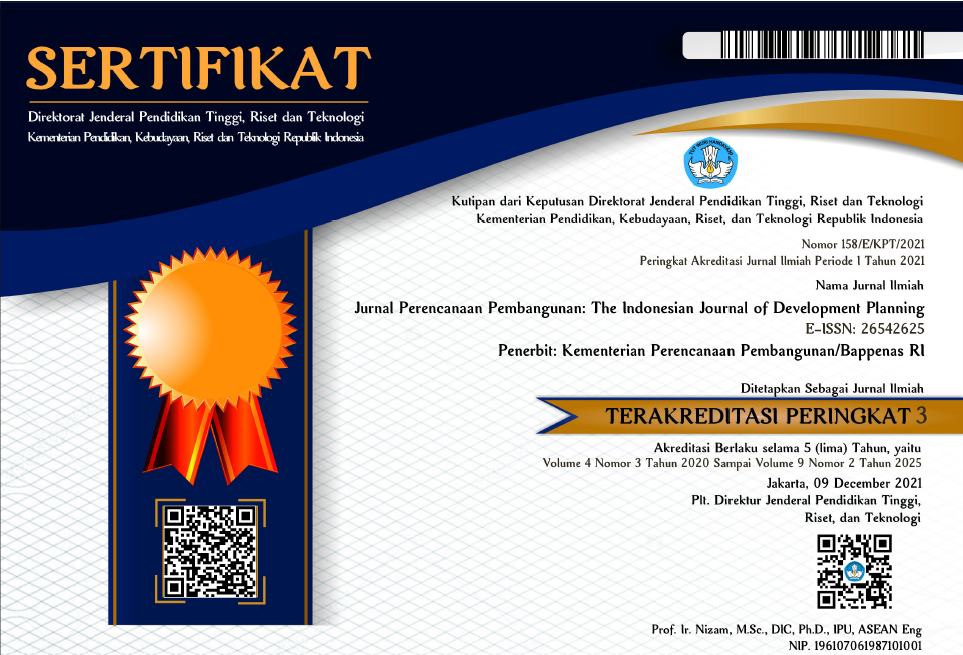School Starting Age and Academic Performance: An Empirical Study in Indonesia
DOI:
https://doi.org/10.36574/jpp.v5i3.218Keywords:
school starting age, regression discontinuity design, academic performanceAbstract
School entry regulations in Indonesia have a specific cutoff date for enrolment and it requires children to start school at the age of seven. In practice, there were schools that allowed children to start elementary school before reaching seven years old. This might create age differences between children in the same grade at school. Some literature has been shown that older students outperform younger students in the school outcomes. For instance, higher education attainment, reduce grade repetition, and excellent academic performances. However, limited evidence exists about the school starting age and academic performances in Indonesia. In order to determine whether the school starting age rule in Indonesia affects children’s academic performance, this study utilizes the Indonesian Family Life Survey (IFLS wave) 5 and regression discontinuity design. This study found that older entrance might get lower score compared to the children who start school at early age. Based on the results, entering school earlier might increase the average of total score by 2.687 grade points higher than older entrance.
Downloads
References
Adri, Z. (2019). Usia Ideal Masuk SD Sebuah Pendekatan Psikologi. Gre Publishing.
Angrist, J. D., & Krueger, A. B. (1992). The effect of age at school entry on educational attainment: An application of instrumental variables with moments from two samples. Journal of the American Statistical Association. https://doi.org/10.1080/01621459.1992.10475212
Becker, G. S. (1962). Investment in Human Capital: A Theoretical Analysis. Journal of Political Economy. https://doi.org/10.1086/258724
Bedard, K., & Dhuey, E. (2006). The persistence of early childhood maturity: International evidence of long-run age effects. Quarterly Journal of Economics. https://doi.org/10.1162/qjec.121.4.1437
Black, S. E., Devereux, P. J., & Salvanes, K. G. (2011). Too young to leave the nest? The effects of school starting age. Review of Economics and Statistics. https://doi.org/10.1162/REST_a_00081
Borghans, L., & Diris, R. (2012). An Economic Analysis of the Optimal School Starting Age. SSRN Electronic Journal. https://doi.org/10.2139/ssrn.2022360
Cook, P. J., & Kang, S. (2016). Birthdays, schooling, and crime: Regression-discontinuity analysis of school performance, delinquency, dropout, and crime initiation. American Economic Journal: Applied Economics, 8(1), 33–57. https://doi.org/10.1257/app.20140323
Cunha, F., Heckman, J. J., Lochner, L., & Masterov, D. V. (2006). Chapter 12 Interpreting the Evidence on Life Cycle Skill Formation. Handbook of the Economics of Education, 1(06), 697–812. https://doi.org/10.1016/S1574-0692(06)01012-9
Datar, A. (2006). Does delaying kindergarten entrance give children a head start? Economics of Education Review. https://doi.org/10.1016/j.econedurev.2004.10.004
Dee, T. S., & Sievertsen, H. H. (2018). The gift of time? School starting age and mental health. Health Economics (United Kingdom). https://doi.org/10.1002/hec.3638
Deliviana, E. (2017). Mempersiapkan Anak Masuk Sekolah Dasar. Jdp.
Dhuey, E., Figlio, D., Karbownik, K., & Roth, J. (2019). School Starting Age and Cognitive Development. Journal of Policy Analysis and Management, 38(3), 538–578. https://doi.org/10.1002/pam.22135
Elder, T. E., & Lubotsky, D. H. (2009). Kindergarten entrance age and children’s achievement: Impacts of state policies, family background, peers. Journal of Human Resources, 44(3), 641–683. https://doi.org/10.3368/jhr.44.3.641
Fertig, M., & Kluve, J. (2005). The Effect of Age at School Entry on Educational Attainment in Germany. IZA Discussion Paper.
Fredriksson, P., & Öckert, B. (2005). Is Early Learning Really More Productive? The Effect of School Starting Age on School and Labor Market Performance. IZA Discussion Paper, 1659.
Frölich, M., & Huber, M. (2017). Including Covariates in the Regression Discontinuity Design. 11138.
Herbst, M., & Strawi?ski, P. (2016). Early effects of an early start: Evidence from lowering the school starting age in Poland. Journal of Policy Modeling. https://doi.org/10.1016/j.jpolmod.2016.01.004
Kaila, M. (2017). The Effects of Relative School Starting Age on Educational Outcomes in Finland. VATT Institute for Economic Research.
Kartal, H., Balantekin, Y., & Bilgin, A. (2016). The Importance of Early Childhood Education and School Starting Age in the Reading-Writing Learning Process. Participatory Educational Research, 3(1), 79–101. https://doi.org/10.17275/per.16.05.3.1
Kawaguchi, D. (2006). The Effect of Age at School Entry on Education and Income 1. Social Research, 162.
Kawaguchi, D. (2011). Actual age at school entry, educational outcomes, and earnings. Journal of the Japanese and International Economies. https://doi.org/10.1016/j.jjie.2009.02.002
Landersø, R., Nielsen, H. S., & Simonsen, M. (2017). School Starting Age and the Crime-age Profile. Economic Journal. https://doi.org/10.1111/ecoj.12325
Lee, D. S., & Lemieux, T. (2010). Regression Discontinuity designs in economics. Journal of Economic Literature. https://doi.org/10.1257/jel.48.2.281
Mayer, S. E. and D. K. (1999). “Does the Timing of School Affect How Much Children Learn?” In Earning and Learning: How School Matters (pp. 79–102). Brookings Institution and Russell Sage Foundation.
McEwan, P. J., & Shapiro, J. S. (2008). The benefits of delayed primary school enrollment: Discontinuity estimates using exact birth dates. Journal of Human Resources. https://doi.org/10.3368/jhr.43.1.1
Pellizzari, M., & Billari, F. C. (2012). The younger, the better? Age-related differences in academic performance at university. Journal of Population Economics, 25(2), 697–739. https://doi.org/10.1007/s00148-011-0379-3
Rizally, M. A. (2014). Korelasi antara usia kronologis awal masuk sekolah terhadap prestasi belajar. E-JUPEKhu (Jurnal Ilmiah Pendidikan Khusus), 3(September), 140–148.
Sharp, C. (2002). School Starting Age?: European Policy and Recent Research. LGA Seminar “When Should Our Children Start School?”
Smith, J. (2009). Can regression discontinuity help answer an age-old question in education? the effect of age on elementary and secondary school achievement. B.E. Journal of Economic Analysis and Policy, 9(1). https://doi.org/10.2202/1935-1682.2221
Stipek, D. (2002). At What Age Should Children Enter Kindergarten? A Question for Policy Makers and Parents. Social Policy Report. https://doi.org/10.1002/j.2379-3988.2002.tb00018.x
Strauss, J., Witoelar, F., & Sikoki, B. (2016). The Fifth Wave of the Indonesia Family Life Survey: Overview and Field Report: Volume 1. In The Fifth Wave of the Indonesia Family Life Survey: Overview and Field Report: Volume 1. https://doi.org/10.7249/wr1143.1
Wicaksono, T. Y., & Witoelar, F. (2019). Early Experience and Later Outcomes of Education: Schooling Transition Evidence from Indonesia. Bulletin of Indonesian Economic Studies, 55(1), 29–60. https://doi.org/10.1080/00074918.2018.1439156
Zhang, S., Zhong, R., & Zhang, J. (2017). School starting age and academic achievement: Evidence from China’s junior high schools. China Economic Review, 44(2016), 343–354. https://doi.org/10.1016/j.chieco.2017.03.004
Downloads
Published
How to Cite
Issue
Section
License
This is an open-access article distributed under the terms of the Creative Commons Attribution-NonCommercial-ShareAlike 4.0 International License. Copyright © Kementerian PPN/Bappenas RI


















